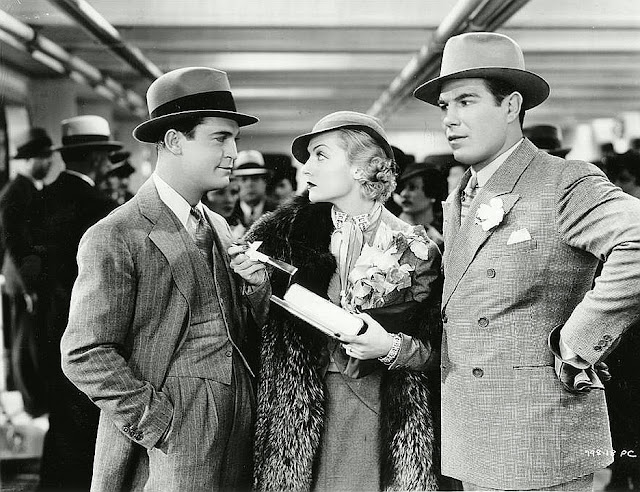1934 was a transitional year in the film industry. The Hays Code, which had been in effect for years but not strictly enforced, was now the law of the land. Hollywood got away with a lot in those few years between the advent of talking pictures and the enforcement of the Code. Pre-Code films went on to become a genre much beloved by future generations of film buffs because of how these early 1930s films pushed boundaries. In an effort to conform to this new censorship, post-code films went through a scrubbing of content, washing away much of what titillated audiences . In 1934 especially, filmmakers were trying to figure out how to get their pre-code stories to fit into this new post-code mold. The Gay Bride (1934) is an example of how fitting a round peg into a square hole just didn't quite work out.
The Gay Bride stars Carole Lombard as Mary, a chorus girl looking to lock her wealthy racketeer boyfriend Shoots Magiz (Nat Pendleton) into holy matrimony. Ignoring the warnings of her trusty sidekick Mirabelle (Zasu Pitts), she manages to snag her cash cow. Due to the nature of his business and its occupational hazards, Mary makes quick work to secure her fortune. On her wedding night, her lawyer finalizes Shoots' will and the next day they set off on a cruise to Europe so Mary can shop to her hearts delight. When Shoots and Mary come back from their mostly disastrous trip (only Greece would have them), more trouble awaits. Shoot's assistant Jimmie (Chester Morris), affectionately referred to as Office Boy, is the only member of Shoots' crew with any common sense. He tries to protect his boss from his impending financial failure but can't protect him from the ill intentions of Mikey The Greek (Leo Carillo) and Daniel J. Dingle (Sam Hardy). All three men have an eye for Mary and one of them is set on removing Shoots permanently. Mary's desire for financial security hangs in the balance as she discovers that mob life is more than she bargained for.
"I wondered when you boys were going to tumble."
Based on Charles Francis Coe's novel Repeal, the title was changed and the story adapted to the screen by husband and wife writing team Sam and Bella Spewack, best known for their collaboration on Broadway play turned movie Kiss Me Kate. This is the only MGM film featuring Paramount star Carole Lombard. MGM was known for quality productions (or as Warner Archive's George Feltenstein called it "the Tiffany's of movie studios) and Lombard assumed this film would be one too. However, her costar Chester Morris knew it was a dud from the start. The film was directed by Jack Conway, a mainstay in the MGM stable of talent. Conway could be counted on to deliver movies to the studio execs on budget and on time.
The Gay Bride was panned by critics and did not perform well at the box office. However Carole Lombard was a bankable star and theatres made the most of it. According to Carole Lombard biographer Michelle Morgan, "The idea of Carole playing a 'gold-digging chiseller' inspired the Lowe's State Theatre in New Orleans to give out special 'Chiseller Club' membership cards to their patrons, with Carole listed as secretary. Nearby stores were also utilized and included movie-inspired floral displays in bridal shops and hair displays in a beauty parlor."
"When you missed meals as a kid money becomes awfully important."
The story had a lot of potential. I was particularly interested in Mary's motivations. She's a glamorous chorus girl who courts the attention of notorious racketeer. Having grown up desperately poor she's hell bent on having a financially secure future. In one scene, Mary tells Mirabelle that she's not about a quick buck rather she wants to have enough money to live comfortably into her 50s, 60s and beyond. A richer story would have explored Mary's history and fleshed out the characters. The final result is a movie that is enjoyable but on the whole superficial.
The Gay Bride is a hybrid of several popular genres. It starts out as a backstage story, morphs into a gangster flick, then into a screwball comedy and ends with a romance. Tying it all together is this thread living through the Great Depression. While the story and characters are lacking, viewers will be delighted by the superb cast including some 1930s all-stars like Carole Lombard, Chester Morris, Nat Pendleton and Zasu Pitts, who are all personal favorites of mine. Actor Gene Lockhart has a small uncredited role. The movie's dialogue is witty and I found myself writing down several fun quotes. I'd be interested in reading the original source material to see what potential there was in making The Gay Bride/Repeal into a Pre-Code film.
The Gay Bride (1934) is available on DVD-MOD from the Warner Archive Collection. You can hear the WAC trio George, D.W. and Matt discuss the film on the Warner Archive Podcast.
Warner Archive Wednesday - On (random) Wednesdays, I review one title from the Warner Archive Collection. Thank you to Warner Archive for sending me a copy of The Gay Bride (1934) to review!



















